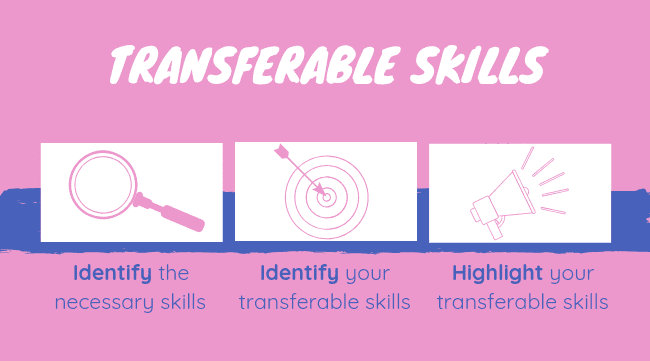
Thinking about changing careers but not sure how you would land a new job with little to no experience? Often forgotten, your transferable skills are fundamental when considering working in a different field of work. Transferable skills are the capabilities you’ve gained from previous positions or experiences that are transferable to a different type of career or industry. For example, employers seek candidates who possess organizational or time management skills, qualities you most likely have developed from your past professional experiences. Follow these strategies to seamlessly transfer your skills as you make your move from one industry to another.
Identify the necessary skills
First, you need to identify which skills are needed for a completely new role. Research specific companies and industries and take a look at different job descriptions to figure out what qualifications are required. When considering a different role, don’t rule out any of your soft skills (good communication, problem-solving, and team player) or your hard skills (proficiency in a foreign language, computer programming, a specific degree or certification). Both skill sets will likely come in handy when transitioning and can potentially be a valuable asset. Also, keep in mind, tweaking the context of your skills to match the job requirements may be necessary.
Identify your transferable skills
Once you recognize which skills employers are seeking, you need to identify which of your acquired skills are transferable to that new industry. Because you are applying to a completely new role, you need to get creative when highlighting the skills you’ve developed from your different responsibilities. Skills that are reliant on a specific industry will be more difficult to transfer but it can be done. Think about the different steps you took to complete previous tasks and the skills you utilized to get each one done. Recognize how each skill enabled you to do your job better. Any skills that match the demanded skills for your target field are your transferable skills.
Every individual’s transferable skills will vary, but below are some common transferable skills you can hone in on:
- Using software or computers
- Analyzing/Researching data or documents
- Organizing information
- Editing or filing
- Interacting with customers and colleagues
- Training or interviewing
- Budget management
- Project management
- Ability to motivate others
- Community building
- Multitasking
How to highlight your skills
You know the skills you need, you know the skills you have, now you need to highlight them to potential employers. After doing your research, subtly reference your relevant skills on your resume and cover letter. When shaping your resume, list your transferable skills under employment history descriptions in chronological order. For your cover letter, explain why you are passionate about changing careers and how your previous employment and skills make you a qualified candidate, even if you have no experience. Mention two transferable skills that match the job description in the body paragraph. When interviewing, reference the transferable skills that enabled you to successfully complete your work in the past.
 Jumping into a new career is a stressful, exciting and can be a very rewarding experience. If you have no experience or are seeking additional information about a specific industry or role, get out there and network! Connecting with people within your desired industry will help you gain a clearer idea of their responsibilities and will help you build meaningful relationships with people who could open the doors to new opportunities. When making a career change, if you identify, recognize, and highlight your transferable skills, you will realistically land a job in the new industry you want to be in.
Jumping into a new career is a stressful, exciting and can be a very rewarding experience. If you have no experience or are seeking additional information about a specific industry or role, get out there and network! Connecting with people within your desired industry will help you gain a clearer idea of their responsibilities and will help you build meaningful relationships with people who could open the doors to new opportunities. When making a career change, if you identify, recognize, and highlight your transferable skills, you will realistically land a job in the new industry you want to be in.
Want more information that will help you to succeed in your career? Subscribe to our JOHNLEONARD blog below and receive the latest career advice!
